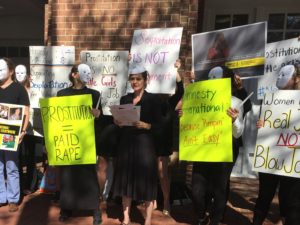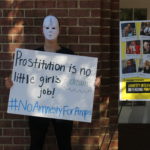Statement Made at the DC Protest Against Amnesty International:
“An Orwellian Moment”
By Lisa L. Thompson
We are gathered here today, in solidarity with groups around the world, to voice our opposition to Amnesty International’s support of full decriminalization of prostitution.
Full decriminalization of prostitution in no way rectifies the conditions of inequality, abuse, violence, and dehumanization which animate all forms of prostitution—it tragically assents to them.
This is undoubtedly an Orwellian moment: Orwellian because the very institution that the world has looked to for leadership and truth on grave human rights concerns—Amnesty International—is now engaging in doublethink, asserting that it has the rights and well-being of those in prostitution as its primary concern, while simultaneously advocating for the decriminalization of pimps and sex buyers(1). These are two mutually exclusive beliefs. As long as one is not under the spell of doublethink, it is impossible to believe in the humanity and dignity of those in prostitution, while supporting the rights of others to use and abuse them.
While pop culture might celebrate pimp culture through songs like “Big Pimpin” or “P.I.M.P.” or “Pimpin Ain’t Easy”—those fighting for equality and the abolition of sexual exploitation, expect an organization as lauded as Amnesty International to distinguish fantasy from fact. But tragically, Amnesty appears to have bought the myth that “It’s Hard out Here for a Pimp,” and, to quote Big Daddy Kane, “Anything goes when it comes to hoes.”
However, this shouldn’t come as a surprise when one considers the kinds of input that Amnesty has welcomed to the table as it formed its policy. For instance, there is Alejandra Gil who served as the vice president of the Global Network of Sex Work Projects, a group that AI’s Advisory Council references as contributing to the formation of its prostitution policy. This past March Ms. Gil—also known as the Madame of Sullivan—was convicted in Mexico City of sex trafficking and was sentenced to 15 years in prison. Her pimping operation exploited nearly 200 women.(2)
Let’s be perfectly clear: pimps and madams are sex traffickers. They recruit, harbor, transport, provision, and obtain, by force, fraud, and coercion persons for exploitation in the sex trade. Let’s also be clear: you can also put lipstick on a pig, but it’s still a pig; you can call a sex trafficker a “sex business operator,” and they are still a sex trafficker.
In its advocacy for limiting the “criminal prohibitions on the organizational aspects of sex work,” Amnesty evidently has adopted the advice of pimps/sex traffickers such as Gil, and in so doing taken on pimps as their primary new constituency. Here are a few introductions to other distinguished members of the pimping community.
- Dennis Hof is owner of a string of legal brothels in Nevada who has recently occupied himself with auctioning off “America’s Next Top Virgin.”
- Jerry Wong, a pimp from Taiwan, offers coupons for deals such as “three girls for the price of two” or “every fourth visit free.”
- Pimpin Ken in his book Pimpology promulgates “the 48 laws of the game,” and declares that, “There are only two categories of people: pimps and hoes. You either give orders or you take them.” He further explains that he utilizes “psychological warfare or Pimpology” to get what he wants, and that this pimpology is “more treacherous than physical abuse.”
Interestingly, the psychological warfare described by Pimpin Ken and other pimps, comports perfectly with what Amnesty should recognize as psychological torture—Amnesty’s own 1975 Report on Torture outlines methods of coercion and control used on political prisoners in what is known as “Biderman’s Chart of Coercion.”
Anybody familiar with prostitution will immediately recognize that the methods outlined in Biderman’s chart (i.e. isolation, monopolization of perception, induced debility and exhaustion, threats, occasional indulgences, demonstrating omnipotence, degradation, enforcing trivial demand), are exactly the same types of tactics that are used by pimps to dominate and control those they prostitute.
Thus, in Amnesty’s support for “limiting criminal prohibitions on the organizational aspects of sex work,” it is as if Peter Benenson (Amnesty’s founder) instead of crying out against the imprisonment, torture, and execution of political prisoners in his famous article of 1961– was actually offering policy guidance by which Antonio de Oliveira Salazar might be aided in his Estado Novo to silence his political opposition. Had that been the case, what we know today as Amnesty International would have been aptly named “Impunity International.” Today, in light of its support of pimps and sex buyers, “Impunity International” is the better suited moniker.
aspects of sex work,” it is as if Peter Benenson (Amnesty’s founder) instead of crying out against the imprisonment, torture, and execution of political prisoners in his famous article of 1961– was actually offering policy guidance by which Antonio de Oliveira Salazar might be aided in his Estado Novo to silence his political opposition. Had that been the case, what we know today as Amnesty International would have been aptly named “Impunity International.” Today, in light of its support of pimps and sex buyers, “Impunity International” is the better suited moniker.
The famous article by Benenson which led to the formation of Amnesty International was called, “The Forgotten Prisoners.” I encourage members of Amnesty International to revisit that article and imagine it as an article written on behalf of prostituted women. Such an article might have read like this:
“Open your newspaper any day of the week and you will find a report from somewhere in the world of someone—most likely a woman or transgendered person—being beaten, assaulted, tortured, or murdered because they are prostitutes—because as a prostituted person they are deemed as disposable. There are several million such people in the prison of prostitution – by no means all of them behind the “Red Curtain” of legal sex industries – and their numbers are growing. The newspaper reader feels a sickening sense of impotence. Yet if these feelings of disgust all over the world could be united into common action, something effective could be done.”(3)
And that is why we are assembled here today: because something effective must be done to protect and restore the lives of those destroyed by the commercial sex trade; because people deserve better than prostitution.
I’ve personally seen and met prostituted persons from all over the world. From the red-light slum district of Sonagachi in India; to Bangladesh; Amsterdam; King’s Cross, London; Tijuana, Mexico, and the streets of Baltimore, Maryland, I can assure you it was no life of empowerment, freedom, or dignity for any of the people I met.
Amnesty: it’s not too late to admit that as an institution you’ve made a mistake. It’s not too late to stand up for “The Forgotten Prisoners of Prostitution.”
Footnotes:
[1] This statement emphasizes the issue of Amnesty’s prostitution policy as it relates to pimping. This should not be construed as lack of awareness or concern about the policy’s impact on the male purchase of paid rape (commonly referred to as “prostitution”).
[2] Banyard, K. (2015, Oct 14). “A Human Rights Scandal.” Retrieved at www.faber.co.uk/blog/a-human-rights-scandal-by-kat-banyard/.
[3] This paragraph is a play on the original opening paragraph of “The Forgotten Prisoners,” the article written by Peter Benenson, founder of Amnesty International, which sparked a global movement to fight for the rights of prisoners of conscience.





